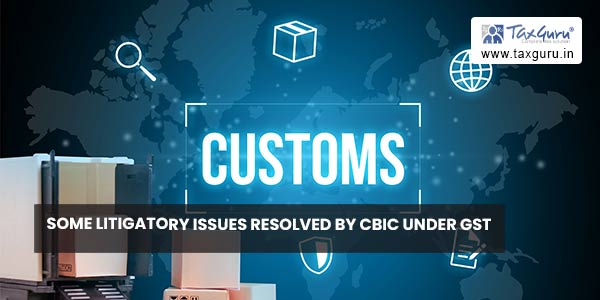Overview
GST the ‘One Nation, One Tax, One Market’ was introduced in 2017 by Kelkar Task Force. The motive behind introduction of GST was to overcome the shortcomings of previous indirect tax regimes. Looking back, almost over five years have been passed since the introduction of GST. The given objective seems far from being achieved consider the large amount of writ petitions and advance ruling applications that are being filed every day.
More than thousands of circulars and notification has been issued under GST till the date in order to remove the inefficiency.
Issues under GST which causes Litigation
There are many issues under GST faced by the taxpayers practically: –
- Treating mostly cases of section 73 under section 74 of CGST Act, 2017
- Lots of advance ruling due to lack of clarity in law
- ASMT-10 issued even before completion of financial year or before due date of annual return
- Issuance of baseless show cause notices and frivolous demand order
- GST Registration suspended without waiting for the reply of issued SCN.
- Alleging taxpayer for non-existence without even carrying out physical verification
- Blocking Input Tax Credit
- Not acknowledging refund application for long time.
- Dispute on deemed distinct person
- Same auto feed response of grievance redressal system for different issues
- Inconsistency regarding amount of input tax credit reflecting on portal
- Not acknowledging FIRA in case of GST refund and many more
Due to enormous confusions, issues, divergent views and complicated procedures, litigation emerged as a new dawn under GST. However, Government is trying to remove such issues by notifications and circulars.
Resolution 1:
No more refund rejection on ground that export of services by one establishment of a person in India to another establishment of the same person outside India, considered as establishments of distinct persons as per Explanation 1 of section 8 of IGST Act
In case of many refund applications where refund is on account of “export of goods and services without payment of tax”, it has been observed that department has denied refund where the supply of service is made by a subsidiary/ sister concern of a foreign company in India incorporated under Indian laws to foreign company which is incorporated under laws of a country outside India by alleging that given case falls under condition (v) of subsection (6) of section 2 of IGST Act.
It can be inculcated from above that departmental officer has mixed up the meaning of related party, separate legal entities and deemed distinct persons.
It can be derived from the above that departmental officer has mixed up the meaning of separate legal entity and deemed distinct persons.
Adverting to the provisions of clause (v) of sub-section (6) of the section 2 of the IGST Act, 2017 –
“Export of services” means the supply of any service when–
(v) the supplier of service and the recipient of service are not merely establishments of a distinct person in accordance with Explanation 1 in section 8;
When establishments of a person would be treated as establishments of distinct persons in context of given issue, is defined under explanation 1 in section 8 of IGST Act, 2017 as –
where a person has, –
(i) an establishment in India and any other establishment outside India
It can be concluded from above that where a person has an establishment in India (Indian Subsidiary) and another establishment of the said person is outside India (Foreign Company) then such establishments shall be treated as establishments of distinct persons.
Further as per the definition of “person” given under section 2(84) of CGST Act, 2017 as well as definition of company and foreign company given under Companies Act, 2013, it is observed that a company incorporated in India and a foreign company incorporated outside India are different person/separate legal entities though they are related parties.
If refund is rejected by declaring export taken place between a subsidiary/ sister concern of a foreign company and such foreign company as related party transaction then no will able to claim refund on account of export of goods and services without payment of tax.
When already so many cases got accumulated on this issue, now, GST Council has given its clarification in taxpayer’s favour only as –
After analysis of aforesaid provisions and considering differential view in mind of departmental officers, it has been clarified by GST council through issuing vide bearing circular No. 161/17/2021 dated 20th September, 2021 that a company incorporated in India and a body corporate incorporated by or under the laws of a country outside India, which is also referred to as foreign company under Companies Act, are separate persons under CGST Act, and thus are separate legal entities. Accordingly, these two separate persons would not be considered as “merely establishments of a distinct person in accordance with Explanation 1 in section 8”.
Resolution 2:
No need of reversal of input credit tax by recipient in case of cancellation of supplier’s registration with retrospective effect as demanding by GST officers
We have seen GST officers quite aggressive towards issuing notices to recipient of goods and services to reverse input tax credit received on supplies received from taxpayer whose registration has been cancelled with retrospective effect.
It is unjustified and leads to undue hardship for the recipient where due to wilful misstatement and short payment/non-payment of tax by supplier, recipient is required to reverse the input tax credit. It leads to double tax burden on recipient’s part.
As per the provisions in respect to input tax credit-
Adverting to Section 16 (1) of CGST Act, 2017 – Every registered person shall be entitled to avail input tax credit, subject to such conditions and restrictions as may be prescribed in section 49, as well as
Section 16(2) of CGST Act 2017, sets out few conditions for availing input tax credit;
1. he is in possession of a tax invoice or debit note issued by a supplier registered under this Act, or such other tax paying documents as may be prescribed;
2. he has received the goods or services or both;
3. subject to the provisions of section 41, the tax charged in respect of such supply has been actually paid to the Government, either in cash or through utilisation of input tax credit admissible in respect of the said supply; and
4. he has furnished the return under section 39.
Provided further that where a recipient fails to pay to the supplier of goods or services or both, other than the supplies on which tax is payable on reverse charge basis, the amount towards the value of supply along with tax payable thereon within period of one hundred and eighty days from the date of issue of invoice by the supplier, an amount equal to the input tax credit availed by the recipient shall be added to his output tax liability, along with interest thereon, in such manner as may be prescribed.
Moreover, the government has emphasised mechanism of reconciling ITC availed in GSTR 3B with that of ITC available in GSTR-2A. If the invoice is reflected in GSTR-2A backed by possession of valid tax invoice document evidencing payment made, nothing can deny the eligibility of Input Tax credit. If default of tax payment made by supplier, then proceedings need to be initiated on supplier.

Further, no disallowance of input tax credit can be made where purchases were made during the period when seller’s registration certificate was active, and for the irregularities of seller, purchaser should not be penalized by reversing ITC. Also, for the sake of argument, if supplier is allegedly involved in fraudulent activities, the recipient of supply should not be responsible for the fault of the vendor. In order to bring uniformity in decision of departmental officers, GST department through GST Instruction no. 02/2022 dated 22.03.2022 i.e., standard of procedure for the scrutiny of returns clearly mentioned that
Claim of ITC in respect of supplies from taxpayers whose registrations have been cancelled retrospectively.
In case of retrospective cancellation of registration of a supplier, the recipient is not entitled to claim ITC in respect of invoices or debit notes issued after the effective date of cancellation of the registration. Effective date of cancellation of registrations of the suppliers, if any, is made available in relevant tables of FORM GSTR-2A. Accordingly, it may be verified whether the registered person has availed ITC in respect of such invoices or debit notes issued by the suppliers after the effective date of cancellation of their registrations. In simple terms, recipient is eligible to claim ITC for all supplies received before cancellation of registration of supplier.
Conclusion
There is not only need of rationalization of law but also imparting proper training to departmental officers is the need of hour. Still many questions and issues of taxpayer are pending in GST which needs clarification to avoid litigation. Further, some positive changes in GST portal like option of revised return, robust grievance redressal system, online revocation of GST registration etc. are also required. GST having its applicability on each and every dealing needs to be streamlined.





